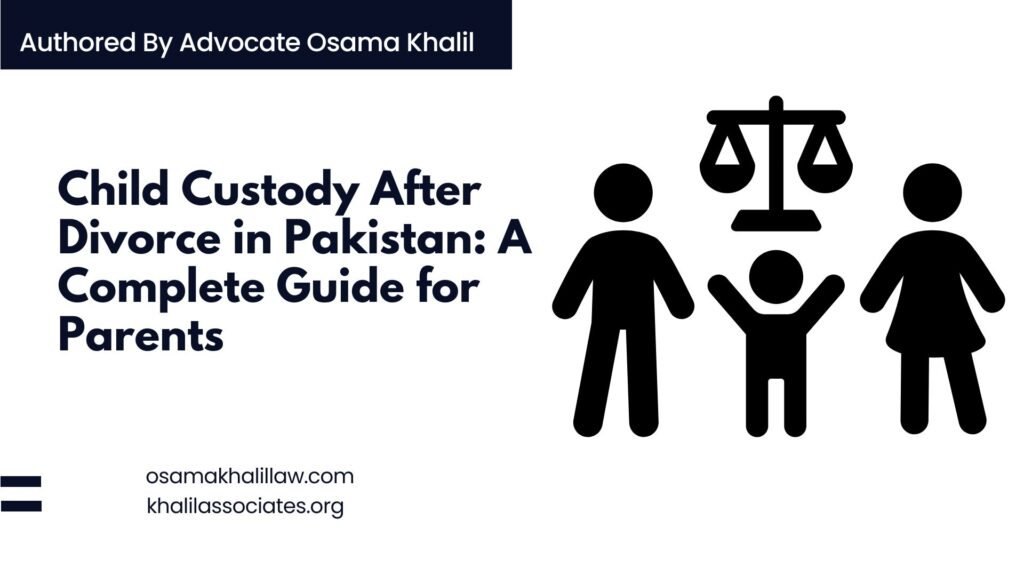
Divorce brings many challenges, especially when children are involved. Parents often worry about child custody in Pakistan. The court decides custody based on the child’s best interests. This article explains everything about custody of child after divorce in simple words.
What is Child Custody in Pakistan?
Child custody means the legal right to care for a child. After divorce, parents must decide who keeps the child. Sometimes, parents agree on custody. Other times, the court intervenes. Guardianship of children is a serious matter in Pakistan.
Types of Child Custody in Pakistan
Pakistan recognizes different types of custody. Each type has specific rules.
Physical Custody
Physical custody means the child lives with one parent. That parent takes care of daily needs. The other parent may get visitation rights.
Legal Custody
Legal custody allows a parent to make major decisions. These include education, health, and religion. Sometimes, both parents share legal custody.
Joint Custody
Joint custody means both parents share responsibilities. The child spends time with both parents. However, joint custody is rare in Pakistan.
Sole Custody
Sole custody gives one parent full control. The other parent may still visit the child. Courts grant sole custody if one parent is unfit.
Child Custody Laws in Pakistan
Pakistan follows Islamic laws for custody. The Guardian and Wards Act 1890 also applies. These laws decide parental rights in Pakistan.
Hanafi School of Thought (Majority in Pakistan)
Under Hanafi law, mothers get custody of young children. Fathers get custody of older children. The exact age depends on the child’s gender.
Shia School of Thought
Shia laws differ slightly. Mothers keep sons until age two. They keep daughters until age seven. After that, fathers may get custody.
Guardian and Wards Act 1890
This law helps courts decide custody. Judges focus on the child’s welfare. They consider parents’ financial and moral conditions.
Mother’s Rights in Child Custody
Mothers usually get custody of young children. Courts believe mothers provide better care. However, mothers must meet certain conditions.
Conditions for Mother’s Custody
- The mother must be mentally and physically fit.
- She must not remarry someone not related to the child.
- She must provide a good moral environment.
If the mother fails these conditions, the father may get custody.
Father’s Rights in Child Custody
Fathers are natural guardians under Pakistani law. They have financial responsibility. However, custody rules favor mothers for young kids.
When Father Gets Custody
- The mother is unfit or remarries.
- The child reaches a certain age (7 for girls, puberty for boys).
- The mother willingly gives up custody.
Fathers must prove they can care for the child better.
Factors Courts Consider in Custody Cases
Courts always prioritize the child’s best interests. They check several factors before deciding.
Child’s Age and Preference
Young children usually stay with mothers. Older children can choose. Courts listen to kids above a certain age.
Parent’s Financial Stability
The parent must afford the child’s needs. A stable income matters in custody battles.
Parent’s Moral Character
Courts reject parents with bad habits. Criminal records or immoral behavior affect custody.
Child’s Emotional Bond
If the child is closer to one parent, courts consider it. Emotional security is crucial.
How to File for Child Custody in Pakistan
Parents must follow legal steps to get custody. The process can be long and complex.
Step 1: Hire a Lawyer
A family lawyer helps with legal procedures. They file petitions and represent in court.
Step 2: File a Custody Petition
The petition states why you deserve custody. Submit it to the family court.
Step 3: Court Hearing
The judge hears both parents. Witnesses and evidence may be presented.
Step 4: Court Decision
The judge decides based on the child’s welfare. The ruling is legally binding.
Challenges in Child Custody Cases
Custody battles can be stressful. Common challenges include:
Parental Conflict
Parents fighting hurts the child. Courts discourage long disputes.
Legal Delays
Court cases take time. Patience is necessary.
False Allegations
Some parents make false claims. Courts investigate thoroughly.
Visitation Rights in Pakistan
The non-custodial parent gets visitation rights. They can meet the child at scheduled times.
How Visitation Works
- Weekly or monthly visits.
- Holidays and special occasions.
- Supervised visits if needed.
Denying visitation without reason is illegal.
Can Custody Orders Be Changed?
Yes, custody orders can be modified. Parents must prove a change in circumstances.
Reasons for Modification
- Parent becomes unfit.
- Child’s needs change.
- Parent relocates.
Courts review new evidence before changing orders.
Rights of Grandparents in Custody
Grandparents can seek custody if both parents are unfit. They must prove they can care for the child.
International Child Custody Cases
If one parent takes the child abroad, legal issues arise. Pakistan has laws to prevent illegal custody transfers.
Conclusion
Child custody in Pakistan depends on Islamic and local laws. Courts always favor the child’s best interests. Parents should cooperate for their child’s future. If you face custody issues, consult a lawyer immediately.
This guide covers all aspects of custody of child after divorce in Pakistan. Understanding parental rights in Pakistan helps in making informed decisions. Always prioritize your child’s well-being in custody matters.
Legal Assistance
For professional legal guidance and support in immigration matters, you may contact:
Mr. Osama Khalil
Lawyer & Legal Consultant
📞 Phone: 0316-1829946
📧 Email: contact@osamakhalillaw.com | contact@khalilassociates.org
